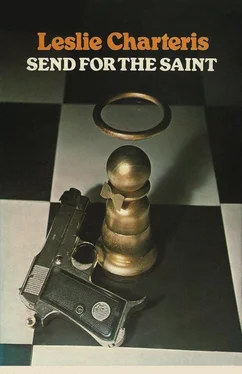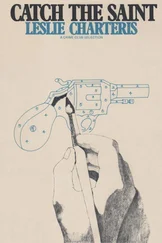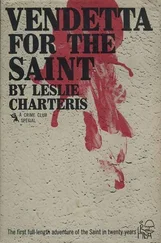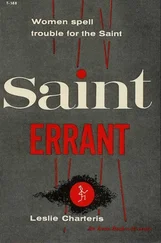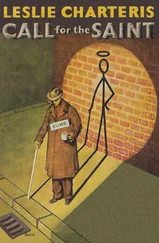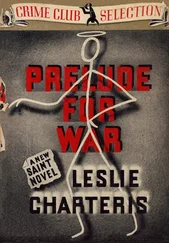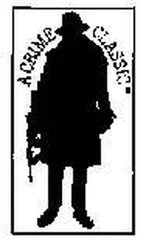Without being too fanciful or pseudo-psychologically analytical, he mused, you could see that room as symbolising two poles of civilisation. On the one hand, culture; and on the other, violence, or naked power. And they met and clashed in that room just as they met and clashed in the man himself.
Rockham was clearly a very deliberate sophisticate. The cultivated exterior was like a hard but semi-transparent coat of varnish that did little to hide the man’s essential ruthlessness of purpose. Simon Templar had broken a lance with most of the available varieties of assorted villains in his time; and his highly attuned antennae for the type told him beyond doubt that Rockham was as formidable as any of the species.
“Take a seat,” Rockham said, ignoring his two standing subordinates. “A glass of port?”
“Very civil of you.”
Rockham got up from his leather-trimmed roll-top desk and strolled over to a corner cabinet. He was wearing a perfectly cut dove-grey lounge suit.
“Congratulations on the break-out,” he said as he poured the two drinks. “You certainly didn’t waste much time.”
“I didn’t much care for the diet. Or the view.”
Rockham’s big square jaw creased momentarily in a mirthless smile as he handed Simon a glass.
“You came straight here.”
It was a calm statement, containing neither surprise nor enquiry; yet somehow it demanded an answer.
“As soon as I could.” Simon decided that he could afford to temper Gascott’s unpleasanter style for the moment, and he consciously blunted the sharp edge of arrogance in his manner. “After all,” he said, “I have to hide out somewhere. And you were right — I need the spondulicks. Three thousand a month I think you said.”
“Two.” Rockham corrected him impassively; but even the lower figure had a discernible stiffening effect on Lembick and Cawber, and the Saint could practically hear their hostility crackling like static in the air.
He made a sour face, and then permitted himself a grin.
“A pity,” he said wistfully. “Still, I suppose one must try to put up with life’s small inconveniences. Man was born to suffer, so they say.” He held the glass up to the light and twirled it approvingly by its elegant spirated stem. “Unusual shape for Waterford.”
“Specially designed for De Valera,” Rockham confided, looking gratified at the appreciation. “What do you make of the port?”
Simon wafted the glass contemplatively back and forth beneath his nostrils for a moment, and then sipped and savoured it.
“Taylor twelve,” he pronounced. “Quite a favourite of mine, as it happens.”
There was a sudden hiss of pent-up exasperation from Lembick.
“Aye,” he scowled. “That’s all very fine. But d’ye know a weapon like you know that stuff?”
He dragged a pistol from his pocket and sent it spinning hard at the Saint, who caught it adroitly with his left hand, putting his drink down at the same moment with his right.
“Walther PPK, 7.65 millimetres,” he commented with professional detachment. “A good general-purpose weapon.”
He seemed hardly to look at the gun, yet in a few deft movements he had extracted the magazine and cleared the breech, and proceeded with further dismantling. As he stripped down the gun he sent the parts, beginning with the magazine, flying in quick succession at Lembick, who fielded them awkwardly.
“As I say, a nice little weapon,” the Saint rasped in conclusion, as he flipped the last piece — the heavy butt section — at Lembick’s midriff.
Rockham smiled broadly at the exhibition.
“Satisfied, Lembick?”
“We’ll see,” grunted the lowering Lembick. “we’ll see how he makes out in training.”
To Simon, Rockham said: “I’m impressed with you, Gascott. But don’t get any ideas above your present station. You’ll be watched closely. You won’t be permitted to leave the premises unaccompanied — not until I’m personally satisfied of your bona fides.”
“Confined to barracks?” Simon shrugged unconcernedly. “Suits me, for the time being. I’m not exactly anxious to go on public parade just at the moment.”
The other nodded, toying thoughtfully with his glass.
“I think there’s a future for you in The Squad. I hope you’ll think so too, when you’ve seen how we operate. Tomorrow you’ll be shown our facilities.”
“For the... cultivation of physical efficiency?” The Saint’s infinitesimal lift of one interrogative eyebrow was only faintly mocking. Rockham chuckled.
“A neat cover, don’t you think?”
“Good enough to explain anything a visiting meter-reader might see, I guess.”
“Exactly. We have to let a few outsiders in. Deliveries, phone repairs, and so forth. The physical efficiency idea covers the lot: the fit men, the gunshots — we’ve got a pistol and a rifle range — the exercises, of one kind and another.”
Simon looked into the blue eyes that were almost transparently pale; and he saw that those eyes burned with a kind of cold fire of pride, and he knew then that John Rockham was separated by only a hair’s breadth from madness.
“What about passers-by who see your sign,” he inquired, “and feel an overpowering urge to get themselves physically efficient?”
“I simply turn them away,” Rockham said, smiling and spreading his hands in a gesture that conveys how effortlessly he was able to put prospective customers off. “We’re always full. We’re a very exclusive establishment.”
And Rockham laughed, and the Saint knew that there was no more mirth in that laugh than in the hollow one he himself had perfected for his role.
The laugh, the smile, faded. Rockham’s manner became instantly brisk and businesslike.
“We’re flexibly organised here,” he said. “No fixed ranks — except mine as C-in-C. I assign authority for the duration of each individual mission. Lembick and Cawber here, as you’ll have gathered, have special duties in training and generally keeping an eye on new recruits. They have my authority to drive you, and drive you hard.” Rockham stood up. “I’ll admit there have been one or two unfortunate errors of recruitment — men who couldn’t make the grade. It’s a pity about them. We’ve no room for slackers or failures in The Squad.” He shook Simon by the hand. “But somehow I don’t expect you to be among them. I expect great things of you, Gascott.” To Lembick and Cawber he said: “Show him his room.” And as they followed the Saint through the door, he added quietly: “You’ve got a week to bring him up to scratch.”
The Saint woke up from his light doze at one o’clock in the morning with that infallible cat-like faculty for instant alertness which had served him so well in his hazardous career.
But this time it was not that his ever-vigilant hearing had roused him in response to some faint intrusion of real sound. It was simply that his mental alarm clock, a wholly inaudible and discreet device which he had set a couple of hours earlier, had gone off exactly as intended. He had told it to wake him at one; and it had done so.
Timing was of some importance if he was to avoid risking an encounter with the guard patrols. Their concern was chiefly with any unauthorised visitors, but his own position if he were intercepted would be no more healthy.
The estate was roughly rectangular, with the conglomeration of buildings somewhat west of centre and with the main gate set in the middle of the long south wall. From the window of his room he could see the two man inner patrol during part of their continuous circuit around the buildings, and he knew that there was a similar patrol throughout the night on the much wider circuit just inside the wall. Pelton had mentioned guard dogs, but he had not yet seen any sign of them — perhaps they were kept in reserve, to be unleashed only in extreme emergency.
Читать дальше
